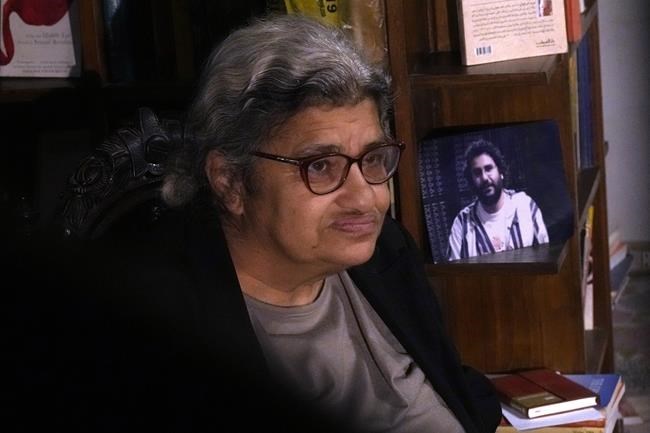CAIRO (AP) — The family of imprisoned Egyptian activist Alaa Abdel-Fattah said they were allowed into the prison and saw him on Thursday and that his condition has “deteriorated severely” following a dramatic hunger strike.
The news was posted in a tweet by his sister Mona Seif after a visit to the prison of Wadi el-Natroun, north of Cairo, by the activist's mother, aunt and his other sister. It was their first time seeing him in nearly a month.
“News from the visit are unsettling,” Mona tweeted, adding that her brother had “deteriorated severely in the past 2 weeks.” She did not elaborate more on his health but said the family would share more information later in the day.
Abdel-Fattah is one of Egypt’s most prominent pro-democracy campaigners. He had intensified a hunger strike and halted all calories and water at the start earlier in November of the U.N. climate conference underway in Egypt's Red Sea resort of Sharm el-Sheikh, to draw attention to his case and those of other political prisoners.
Concerns for his health intensified as the family was barred from seeing him. Last Thursday, prison authorities began an unspecified medical intervention on Abdel-Fattah — prompting thoughts that he was being force-fed.
Then earlier this week, Abdel-Fattah informed his family in handwritten notes that he first started drinking water again and then also ended the hunger strike.
Abdel-Fattah’s mother, Laila Soueif, received two short letters in her son’s handwriting, on Monday and Tuesday, through prison authorities. The first letter, confirming Abdel-Fattah had started drinking water again, was dated on Saturday, while the second letter, confirming he had ended his hunger strike was dated Monday.
‘‘I’ve broken my strike. I’ll explain everything on Thursday,’’ the second letter read. The circumstances under which he wrote the letter were not clear. The activist had previously said he was willing to die in his strike if not freed.
The family has not seen Abdel-Fattah since the last pre-allotted visit on Oct. 24 and had not been given information on his condition. In the note, Abdel-Fattah asks his mother to bring a cake to celebrate his upcoming birthday. The meetings, conducted behind a glass barrier, usually last for around 20 minutes.
Abdel-Fattah, who turns 41 on Friday, has spent most of the past decade in prison because of his criticism of Egypt’s rulers. Last year, he was sentenced to five years for sharing a Facebook post about a prisoner who died in custody in 2019.
His hunger strike drew attention on Egypt’s heavy suppression of speech and political activity, during the Arab nation hosting of the U.N. climate summit, known as COP27. Since 2013, President Abdel-Fattah el-Sissi’s government has cracked down on dissidents and critics, jailing thousands, virtually banning protests and monitoring social media.
At the climate gathering, British Prime Minister Rishi Sunak, French President Emmanuel Macron and German Chancellor Olaf Scholz all raised the activist’s case in their talks with el-Sissi. Abdel-Fattah had gained British citizenship earlier this year through his mother who was born in London.
Egypt’s foreign minister has tried to talk down the attention on Abdel-Fattah. In an interview with The Associated Press on Saturday on the sidelines of COP27, Sameh Shoukry said the priority of the summit should be focused on ‘‘the existential challenge related to climate change’’ not the activist’s wellbeing.
Abdel-Fattah rose to fame during the 2011 pro-democracy uprisings that swept through the Middle East, toppling Egypt’s long-time autocratic President Hosni Mubarak. He has been imprisoned several times, and has spent a total of nine years behind bars, becoming a symbol of Egypt’s sliding back to an even more autocratic rule under el-Sissi.
The Associated Press



